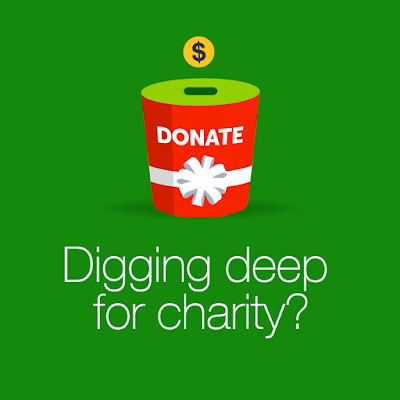DONATIONS
Feeling charitable in the lead up to the festive season? Whether you’re digging deep to support your favorite
charity or dropping five bucks into a donation bucket, hang onto those
receipts! You might be able to claim a deduction next tax time.
For your donation to be deductible, it must be for $2 or more and made to what’s called a ‘deductible gift recipient’ (DGR).
For your donation to be deductible, it must be for $2 or more and made to what’s called a ‘deductible gift recipient’ (DGR).
The person that makes the gift (the donor) is the person that can claim a deduction.
What is a
DGR?
A deductible gift recipient (DGR) is an
organization or fund that can receive tax-deductible gifts.
Not all charities are DGRs. For example, in recent
times crowdfunding campaigns have become a popular way to raise money for
charitable causes. However, many of these crowdfunding websites are not run by
DGRs, therefore donations to these campaigns aren't tax-deductible.
When
a gift or donation is deductible
To claim a tax
deduction for a gift or donation, it must meet four conditions:- It must be made to a DGR.
- It must truly be a gift or
donation – that is, you are voluntarily transferring money or property without receiving, or expecting to receive, any material benefit or advantage in return. A material benefit is an item that has a monetary value.
- The gift or donation must
be of money or property. This can include financial assets such as shares.
- The gift or donation must comply with any relevant gift conditions. For some DGRs, the income tax law adds extra conditions affecting types of deductible gifts they can receive.
Bucket donations
If you made donations of $2 or more to bucket collections – for example, to collections conducted by an approved organization for natural disaster victims – you can claim a tax deduction for gifts up to $10 without a receipt. To claim contributions of more than $10 you need a receipt.What you can't claim
You can't claim gifts or donations that provide you
with a personal benefit, such as:
- raffle or art union tickets – for example, an RSL Art Union prize
home
- items such as chocolates, mugs, keyrings, hats or toys that have an
advertised price
- the cost of attending fundraising dinners, even if the cost exceeds
the value of the dinner. You may be eligible to claim a deduction as a
contribution if the cost of the event was more than the minor benefit
supplied as part of the event.
- membership fees
- payments to school building funds made in return for a benefit or
advantage – for example, as an alternative to an increase in school fees
or placement on a waiting list
- payments where you have an understanding with the recipient that
the payments will be used to provide a benefit to you
- gifts to family and friends, regardless of the reason
- donations made under a salary sacrifice arrangement
- donations made under a will.
You can't claim a tax deduction for donations made
to crowdfunding platforms unless they are a registered DGR.
Keeping
donation records
You should keep records of all tax-deductible gifts
and the contributions you make.
When you donate the DGR will usually issue you with
a receipt, although they are not required to. If these circumstances you can
still claim a deduction by using other records, such as bank statements.
If a DGR issues a receipt for a deductible gift,
the receipt must state:
- the name of the fund, authority or institution to which the
donation has been made
- the DGR's ABN (some DGRs listed by name in the law may not have an
ABN)
- that the receipt is for a gift.
If you give through a workplace giving program your
payment summary, income statement or a written record from your employer is
enough evidence.




Comments
Post a Comment